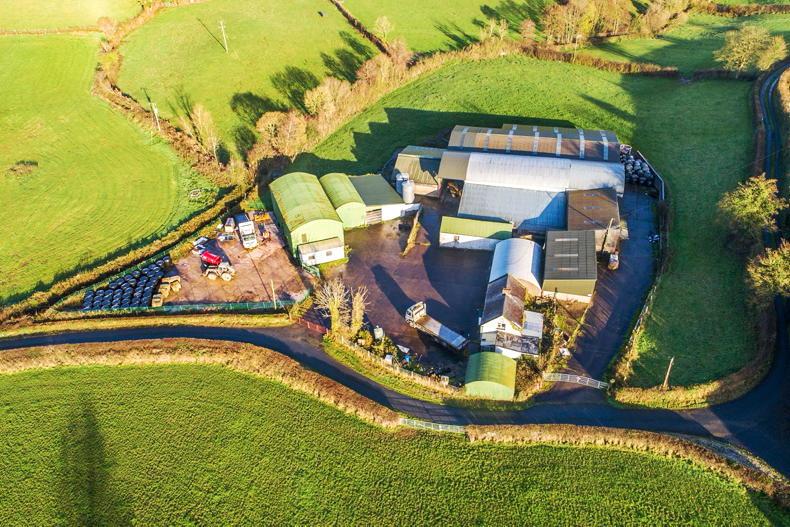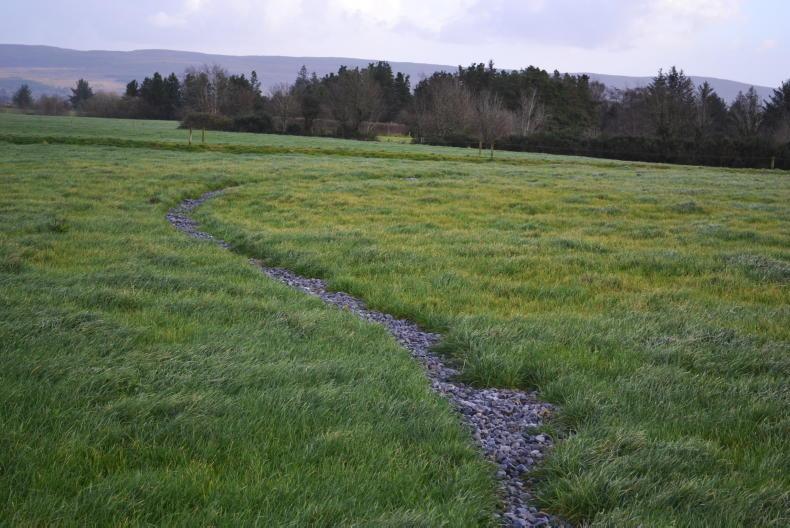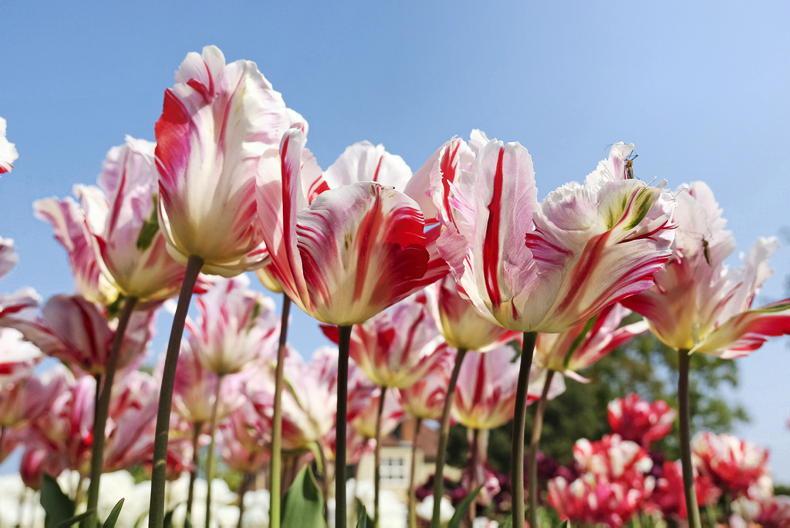The recent cold snap was awkward with frozen pipes needing to be thawed. Old quilts and coats were pressed into service. When Tim went looking for an old quilt, I was glad those spent things hadn’t been consigned to recycling or the bin. The temperature dropped to -8 on the coldest morning. It was great weather to get some jobs done.
I got the dairy painted. I took Ricky with me to buy the rubberised paint. It was a big mistake. Once he heard the word paint, he assumed he was on my painting team.
“Granny, wherever you go, I go” is his latest mantra. Once we arrived in the shop, he ran around selecting his brushes and colours. I explained that we only needed white. “But Granny, I need to paint and I need to do it now,” said he, stamping his feet and turning on the crocodile tears. I was highly amused. Grannies can laugh and placate while Mammies just don’t have time. We settled on one small brush for him and the promise of a painting job. I have just the wall in the tank room for him. I got my task done while he was in playschool.
White lies are necessary to preserve my sanity and that of my grandson. So many jobs are completed while he is at playschool. If he only knew.
Whitewashing
The rain last Saturday brought an end to the cold weather, revealing a few water leaks that needed to be fixed around the yard. We are still in preparatory mode for calving. The first calves are due 1 February. It’s all systems go. The new calf shed is up. Colm is busy drilling, welding, fitting out and fixing all manner of items that are needed in a calf shed. He has piped the services across the yard and so on. He has a long list of must do tasks to complete before the first few calves arrive.
The rain last Saturday brought an end to the cold weather, revealing a few water leaks that needed to be fixed around the yard. We are still in preparatory mode for calving. The first calves are due 1 February. It’s all systems go.
Over the ten years of his official farming career, he has amassed a serious set of tools and skills to go with them. He is also anxious to get home to Elaine and baby Peter in the evenings. Meanwhile, I’m trying to visualise how exactly we will manage the new calf shed. The newborn calves will remain in the top two pens of the existing calf accommodation for a day or two before being transported across. I gave those pens a few coats of white wash to guard against infection. White washing is a most effective and cheap way of making sure a calf house is clean. I learned how to mix and apply it by the side of my late Dad, John, when I was about 12 years old.
The tools needed are few - hydrated lime, some salt, a wide container and a sweeping brush for application. The wearing of eye goggles, a mask and gloves is essential to protect against splashes or burns from the lime. Around the kitchen table, Tim asked why salt was added? Apparently, it’s to slow down the rate of drying so as to get a more durable finish and thereby, prevent flaking.
As for recipes for mixing, I started out with eight cups of lime to one salt in 5 litres of water. It quickly became about 20 measures of lime to get the right (watery paint) consistency. While applying it, I remembered with fondness my earlier white washing days. Ideally, it is a summer job.
To-to-list
Some farmers have calves on the ground already and have commenced milking. We find that delaying until the start of February allows for more grass in front of the cows. I was glad that we didn’t have newborn calves around during the storm last Sunday. We had a power outage for a few hours in the afternoon but otherwise escaped without any structural damage. As we near calving, the heifers teats are sprayed every other day to prevent mastitis. The to-do list is long but will get shorter each day in the coming week with all hands on deck. Things like milk replacer and starter calf ration are ordered.
It is important to get adequate sleep too and to pace ourselves before the spring work begins. I go into it full of hope for a successful season
ahead.
Read more
Meet the Maker: Galway-based painter Tiffani Love
Supporting local farmers: from farm to shop
The recent cold snap was awkward with frozen pipes needing to be thawed. Old quilts and coats were pressed into service. When Tim went looking for an old quilt, I was glad those spent things hadn’t been consigned to recycling or the bin. The temperature dropped to -8 on the coldest morning. It was great weather to get some jobs done.
I got the dairy painted. I took Ricky with me to buy the rubberised paint. It was a big mistake. Once he heard the word paint, he assumed he was on my painting team.
“Granny, wherever you go, I go” is his latest mantra. Once we arrived in the shop, he ran around selecting his brushes and colours. I explained that we only needed white. “But Granny, I need to paint and I need to do it now,” said he, stamping his feet and turning on the crocodile tears. I was highly amused. Grannies can laugh and placate while Mammies just don’t have time. We settled on one small brush for him and the promise of a painting job. I have just the wall in the tank room for him. I got my task done while he was in playschool.
White lies are necessary to preserve my sanity and that of my grandson. So many jobs are completed while he is at playschool. If he only knew.
Whitewashing
The rain last Saturday brought an end to the cold weather, revealing a few water leaks that needed to be fixed around the yard. We are still in preparatory mode for calving. The first calves are due 1 February. It’s all systems go. The new calf shed is up. Colm is busy drilling, welding, fitting out and fixing all manner of items that are needed in a calf shed. He has piped the services across the yard and so on. He has a long list of must do tasks to complete before the first few calves arrive.
The rain last Saturday brought an end to the cold weather, revealing a few water leaks that needed to be fixed around the yard. We are still in preparatory mode for calving. The first calves are due 1 February. It’s all systems go.
Over the ten years of his official farming career, he has amassed a serious set of tools and skills to go with them. He is also anxious to get home to Elaine and baby Peter in the evenings. Meanwhile, I’m trying to visualise how exactly we will manage the new calf shed. The newborn calves will remain in the top two pens of the existing calf accommodation for a day or two before being transported across. I gave those pens a few coats of white wash to guard against infection. White washing is a most effective and cheap way of making sure a calf house is clean. I learned how to mix and apply it by the side of my late Dad, John, when I was about 12 years old.
The tools needed are few - hydrated lime, some salt, a wide container and a sweeping brush for application. The wearing of eye goggles, a mask and gloves is essential to protect against splashes or burns from the lime. Around the kitchen table, Tim asked why salt was added? Apparently, it’s to slow down the rate of drying so as to get a more durable finish and thereby, prevent flaking.
As for recipes for mixing, I started out with eight cups of lime to one salt in 5 litres of water. It quickly became about 20 measures of lime to get the right (watery paint) consistency. While applying it, I remembered with fondness my earlier white washing days. Ideally, it is a summer job.
To-to-list
Some farmers have calves on the ground already and have commenced milking. We find that delaying until the start of February allows for more grass in front of the cows. I was glad that we didn’t have newborn calves around during the storm last Sunday. We had a power outage for a few hours in the afternoon but otherwise escaped without any structural damage. As we near calving, the heifers teats are sprayed every other day to prevent mastitis. The to-do list is long but will get shorter each day in the coming week with all hands on deck. Things like milk replacer and starter calf ration are ordered.
It is important to get adequate sleep too and to pace ourselves before the spring work begins. I go into it full of hope for a successful season
ahead.
Read more
Meet the Maker: Galway-based painter Tiffani Love
Supporting local farmers: from farm to shop









SHARING OPTIONS